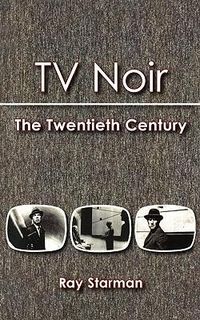 I bought TV NOIR: THE TWENTIETH CENTURY by Ray Starman based on a rave review by my friends over at Bookgasm… and because I'm a sucker for TV books. But TV NOIR was a huge disappointment on just about every level, from the actual printing itself to the thin, badly edited, content.
I bought TV NOIR: THE TWENTIETH CENTURY by Ray Starman based on a rave review by my friends over at Bookgasm… and because I'm a sucker for TV books. But TV NOIR was a huge disappointment on just about every level, from the actual printing itself to the thin, badly edited, content.
Even by self-published/print-on-demand standards, the print quality is awful. The photographs look like reproductions of xeroxes. The copyediting and proofreading are atrocious (missing and inconsistent punctuation, show titles with and without quotation marks, etc). It does not look or read like a professionally published work.
But all of that would be tolerable if the content was worthwhile. Sadly, it's not. There are some compelling ideas here, but you have to slog through some truly awkward, rambling sentences to get to them. Sentences like these:
Stack was able to overcome his 'tennis anyone' roles and an academy award nomination for the melodramatic "Written on the Wind" ('57) to perfect his underplayed and superior to the later Clint Eastwood's monotone style to gain status as a subtle and ironic characterization that was unique.'
Huh? That's crisp, lean, clear prose compared to this sentence:
Add to the list the controversial but I think brilliant 'Blade Runner' ('82) complete with Harrison Ford's tough guy voice-over reminiscent of Bogart in anything and William Holden's commentary in the noir-ish 'Sunset Boulevard' ('50) and you have future noir served on a platter existing in a dark futuristic society where Harrison Ford, as a 21st century ex-cop is recruited to find alien androids settling among humans.
Painful stuff. This is a writer in desperate need of an editor and a few lessons on how to use a comma. The book is about noir, but he uses the word so much, that I often wondered if his goal was to stick it in as many times in as many sentences as he possibly could. For instance:
Although science fiction is not a particularly strong genre for noir analysis, certain key noir elements may still apply it for noir status.
Or
'City of Angels' is another noir curiosity that only ran from February to August 1976 but deserves inclusion because of its private eye genre, it's noir-ish photography and general 1930-1940s style that lent itself to noir iconograpy.
It's a shame he couldn't have stuck the word noir in there one or two more times. He also spends way too much time sharing with us his own, internal debates about whether shows deserved to be included in his book or not. For instance, in the midst of discussing "Harry O," he starts rambling…
Much lighter in tone than the very dark 'The Fugitive', it still did not reach the humorous heights of James Garner's 'Rockford Files' or even Paul Michael Glaser and David Soul's inspired comic renderings of 'Starsky and Hutch'. Two worthy programs I have not included in my analysis because their humor prevented them from noir status. A tough decision, but Garner's often-folksy humor and Glaser and Soul's comedy team antics were just too light for noir justifications.
As if we cared. But more importantly, what the heck does any of that have to do with "Harry O?" Nothing.
I love books about TV, particularly those that focus on cop shows. But this book is a mess. And way, way over-priced at $15.95. Skip it.
